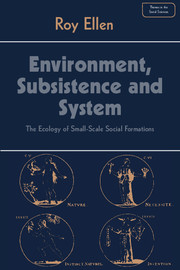Book contents
- Frontmatter
- Contents
- Preface
- Acknowledgements
- 1 ENVIRONMENTAL DETERMINISM AND CAUSAL CORRELATION
- 2 POSSIBILISM AND LIMITING FACTORS
- 3 CULTURAL ECOLOGY AND THE EXPLANATORY IMPERATIVE
- 4 HUMAN ECOLOGY AND THE BIOLOGICAL MODEL
- 5 THE FLOW OF ENERGY AND MATERIALS
- 6 ECOSYSTEMS AND SUBSISTENCE PATTERNS I
- 7 ECOSYSTEMS AND SUBSISTENCE PATTERNS II
- 8 SYSTEMS AND THEIR REGULATION
- 9 INFORMATION AND THE MANIPULATION OF THE ENVIRONMENT
- 10 ADAPTATION: A SUMMARY AND RECONSIDERATION
- 11 THE REPRODUCTION AND EVOLUTION OF SOCIAL AND ECOLOGICAL SYSTEMS
- 12 ECOLOGY IN ANTHROPOLOGICAL METHOD AND THEORY
- Notes
- Bibliography
- Name Index
- Subject Index
11 - THE REPRODUCTION AND EVOLUTION OF SOCIAL AND ECOLOGICAL SYSTEMS
Published online by Cambridge University Press: 05 June 2012
- Frontmatter
- Contents
- Preface
- Acknowledgements
- 1 ENVIRONMENTAL DETERMINISM AND CAUSAL CORRELATION
- 2 POSSIBILISM AND LIMITING FACTORS
- 3 CULTURAL ECOLOGY AND THE EXPLANATORY IMPERATIVE
- 4 HUMAN ECOLOGY AND THE BIOLOGICAL MODEL
- 5 THE FLOW OF ENERGY AND MATERIALS
- 6 ECOSYSTEMS AND SUBSISTENCE PATTERNS I
- 7 ECOSYSTEMS AND SUBSISTENCE PATTERNS II
- 8 SYSTEMS AND THEIR REGULATION
- 9 INFORMATION AND THE MANIPULATION OF THE ENVIRONMENT
- 10 ADAPTATION: A SUMMARY AND RECONSIDERATION
- 11 THE REPRODUCTION AND EVOLUTION OF SOCIAL AND ECOLOGICAL SYSTEMS
- 12 ECOLOGY IN ANTHROPOLOGICAL METHOD AND THEORY
- Notes
- Bibliography
- Name Index
- Subject Index
Summary
History itself is a real part of natural history, and of nature's becoming man
Karl Marx 1975:355MATERIAL FLOW AND THE FLOW OF VALUE
All species require and assimilate energy and materials. Non-human primates, for example, appropriate calories, nutrients and other material substances from the environment around them. Because parts of the natural world are used as food and for other purposes, they may be said to have use values (although to employ this concept does not necessarily imply a uniform means of measuring it). Use values are not produced, they occur naturally, are appropriated and then consumed on an individual basis. Although tools and cooperation may be present, their role is secondary. Dominance hierarchies also exist, but these are based on the strongest individual appropriating the most choice resource, not on the exploitation of labour. Homo sapiens also requires and assimilates energy and materials which can be seen in terms of use values. Although some of these (air, water, certain foods) may be directly consumed on an individual basis, most are obtained through social relations of production whose scope for proliferation and modification is enormous (Ruyle 1973a:606). In short, social production both dominates and determines the character of human appropriation.
Humans not only appropriate use values through social production, but additionally attribute meaning to their environment. Specifically, use values are created not only through the expenditure of effort, but also through the cultural transformation of nature.
- Type
- Chapter
- Information
- Environment, Subsistence and SystemThe Ecology of Small-Scale Social Formations, pp. 252 - 273Publisher: Cambridge University PressPrint publication year: 1982



